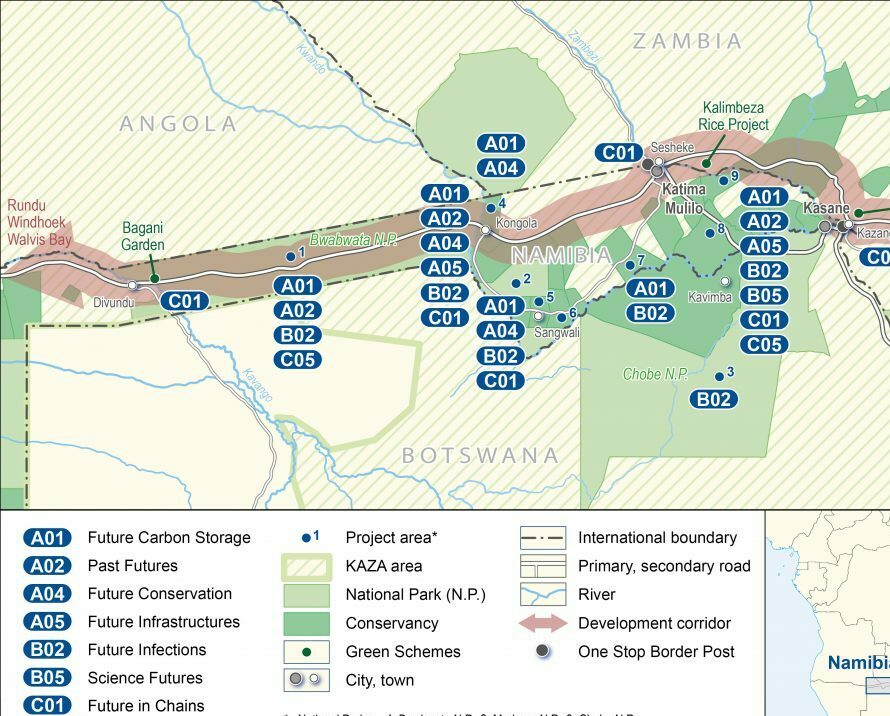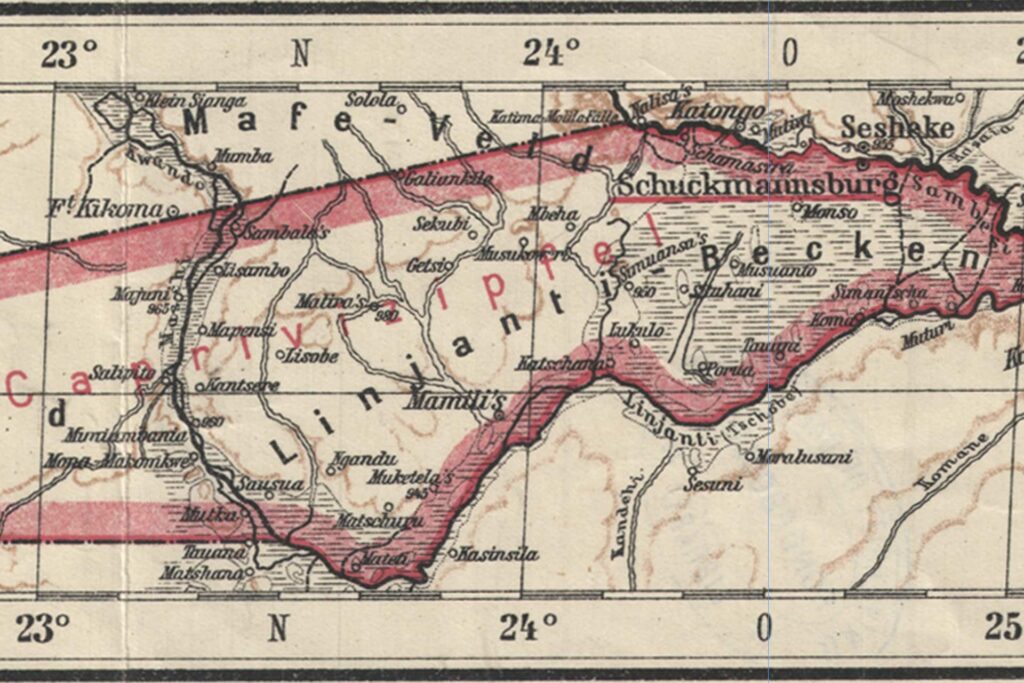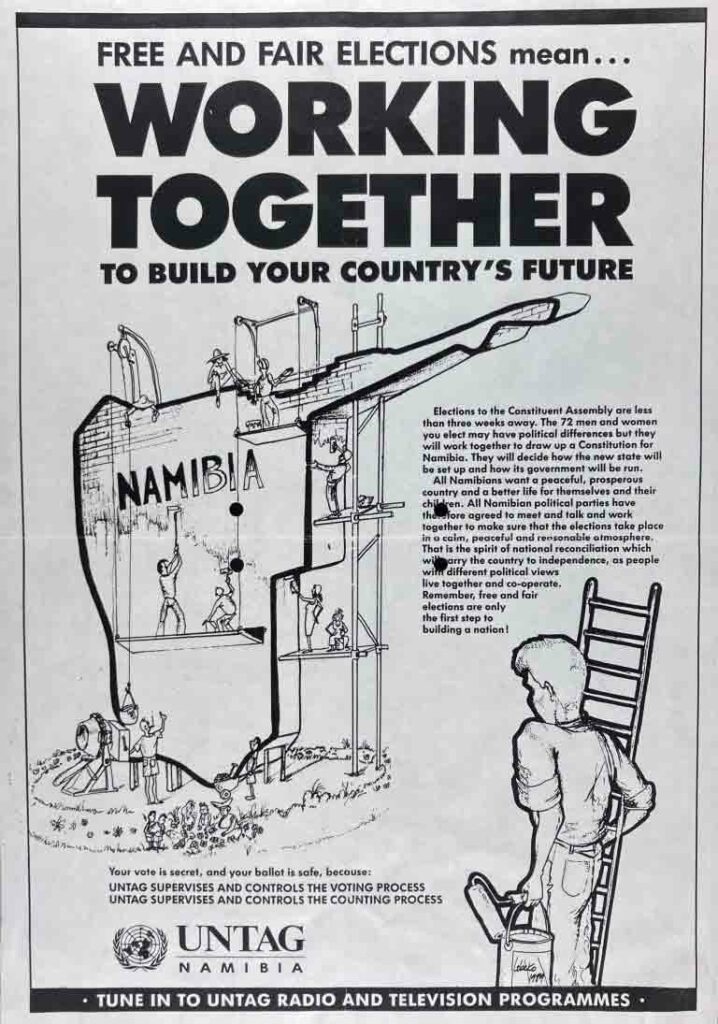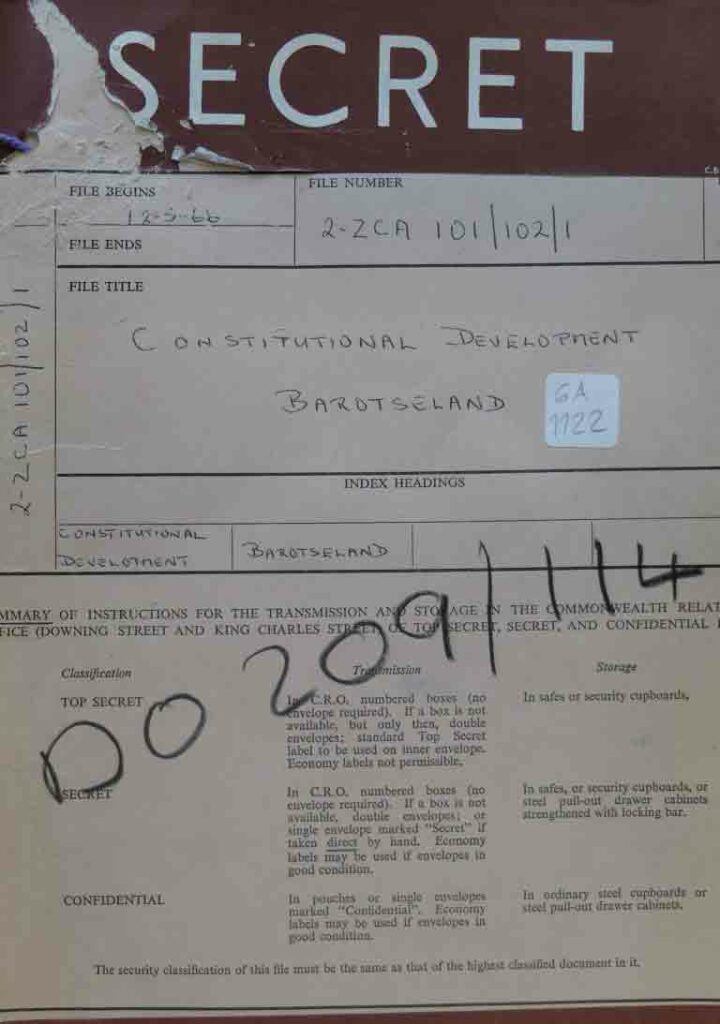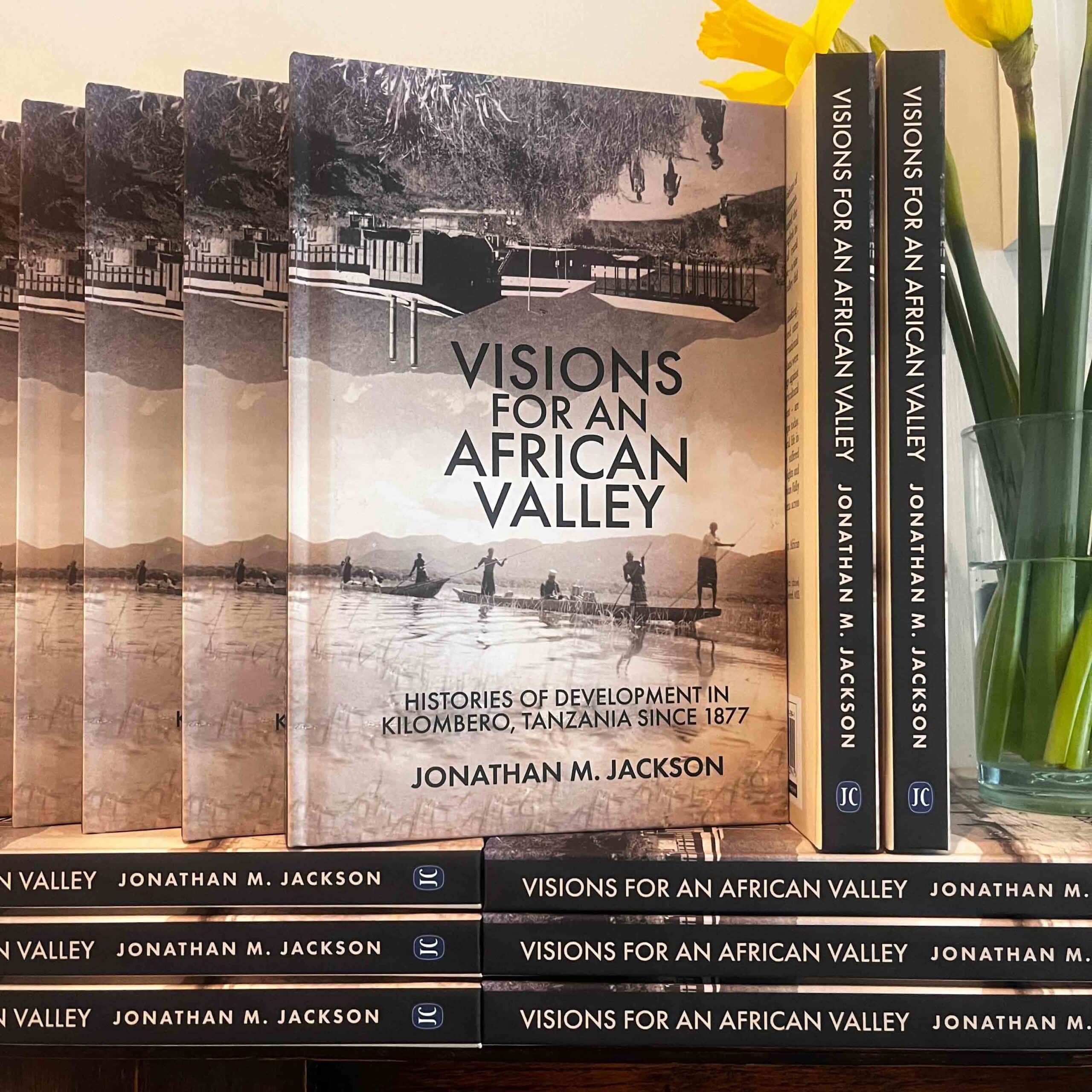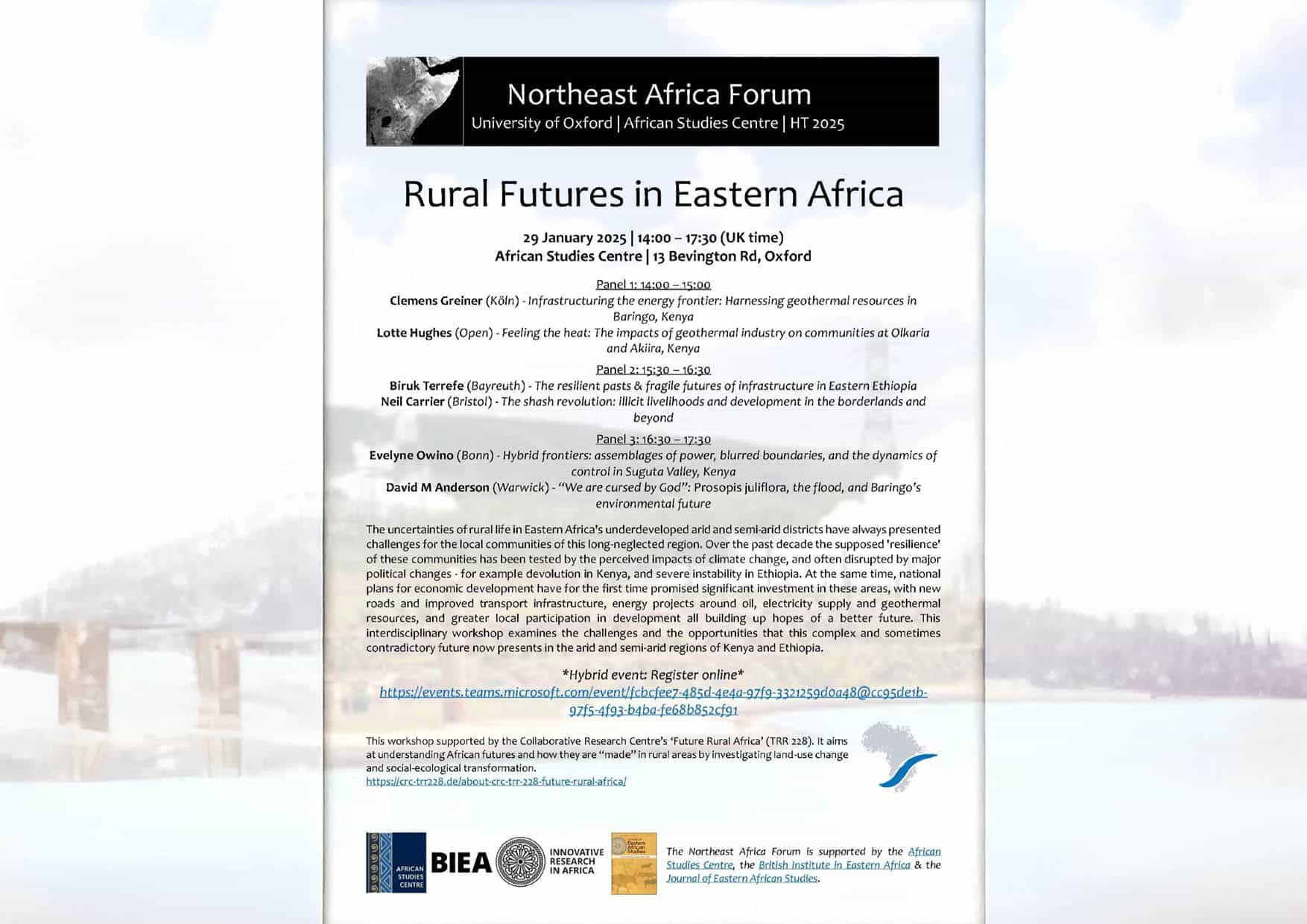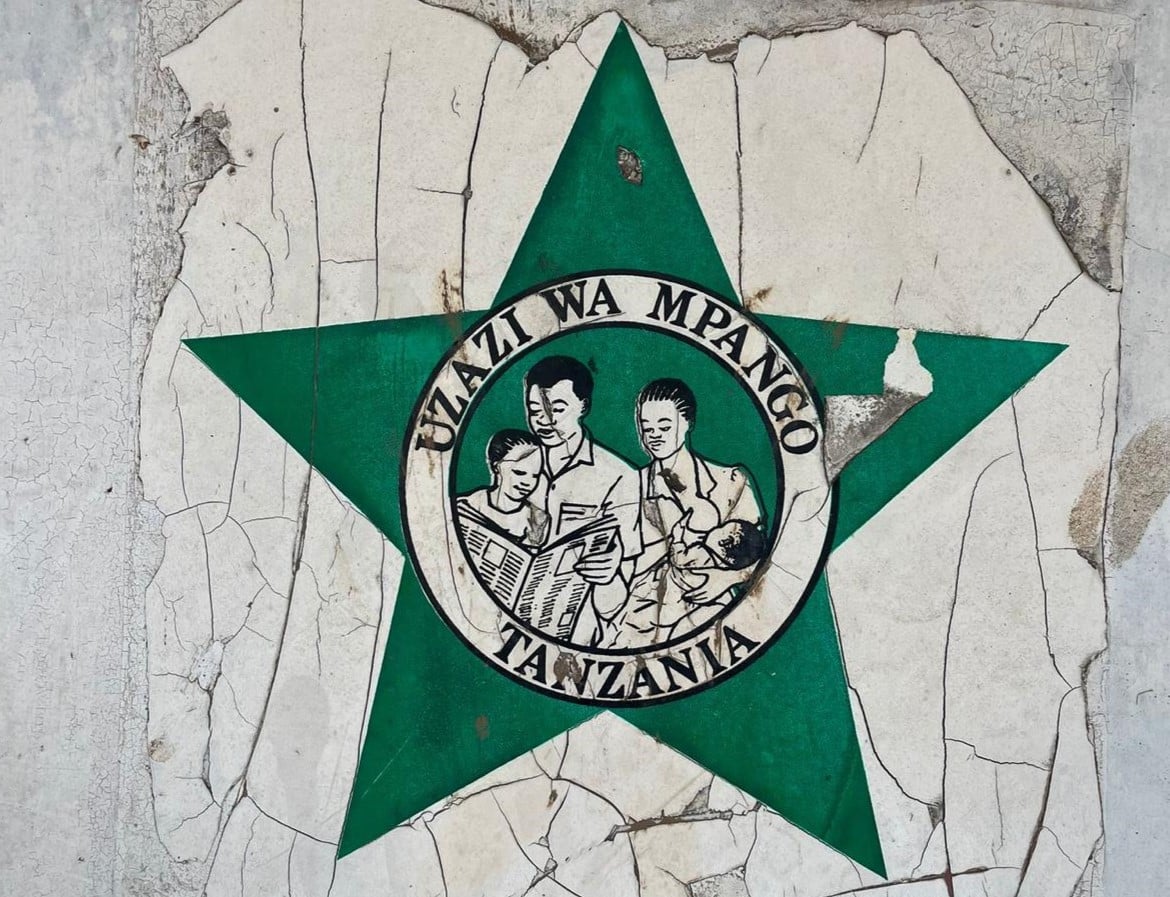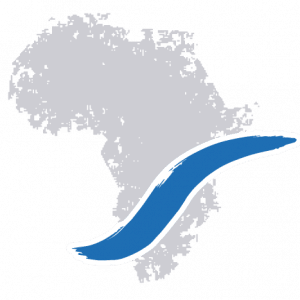CRC TRR 228 Project A02
Past Futures
Micro-histories of rural development in the Kavango-Zambezi Transfrontier Conservation Area
A02 Past Future
Vision
A02 explores the histories of future-making in the borderlands of the KAZA region to understand the processes of development and political change in this rural landscape.
Project Summary
Past Futures investigates the history of ‘future-making’ in the Kavango-Zambezi Transfrontier Area (KAZA), considering the history of rural development and the history of political schemes devised for the administration and control of the KAZA region. These histories have been deeply contested with KAZA, as rival external actors have sought to impose their own visions of the future upon the peoples of the KAZA, and as both movements of colonization and secessionism have challenged the sovereignty of the region. The project adopts a methodology that mixes archival research with the collection and analysis of oral histories.
Rural development programmes have been a prominent feature in the political economy of the region of the Kavango-Zambezi Transfrontier Area (KAZA) since the 1950s, although their character, extent, and aims have varied enormously. Through their policies for development, colonial and then post-colonial governments in this region sought to redefine patterns of land use, dictate the functioning of local social ecologies, and drive local thinking about future-making. The region has also been subject to ambitious political schemes to possess or redefine its sovereignty – involving secessionism, empire-building and radical schemes of ‘future-making’.Past Futures will consider what impact the history of past political and economic development interventions now has upon the reception of and engagement with current initiatives in the region – and the Kavango-Zambezi Transfrontier Area (KAZA) that now binds five countries together in a shared scheme for land management and conservation development. Past, present, and future are linked through community experience of these past interventions: to know what future the rural communities of the KAZA imagine for themselves today, we must understand how their historical experience of past development has shaped their expectations. The project will draw upon case studies from Angola, Namibia, Botswana, Zambia and Zimbabwe, covering the period from 1890 to the present.
Research Regions: KAZA TFCA
Problem Statement
Past Futures investigates the history of ‘future-making’ in KAZA, considering the history of rural development and the history of political schemes devised for the administration and control of the KAZA region. These histories have been deeply contested within KAZA, as rival external actors have sought to impose their own visions of the future upon the peoples of KAZA alongside challenges to the sovereignty of the region from movements of both colonization and secessionism. The project adopts a methodology that mixes archival research with the collection of oral histories, with a strongly critical approach being taken toward both.
Key Questions
- In how far is development in KAZA defined by local demands, or shaped by external supply? To what extent have local communities here got the development they wanted? And to what extent have they appropriated this development?
- Have the benefits of development allowed people to make better futures? Who have been the beneficiaries of rural development interventions, and of the exercises in political ‘future-making’ in KAZA?
Methodology
- Archival Research
- Interviews with prominent community members & (former) government officials
- Oral histories
Key Findings from Phase II
In the second funding period, project A02 focused on histories of economic and social development programmes in Tanzania’s Kilombero Valley. Shifting in Phase II to the KAZA region required us to modify this approach in two respects. First, the history of socio-economic development in the KAZA region was largely thwarted by the political configurations around sovereignty, identity, nationalism and statehood, and by the dominant involvement of the South African apartheid state. Centring on the Zambezi Province (the Caprivi Strip), our research was necessarily adapted to these local realities: development in Caprivi was intensely political, mobilised by the capture and control of resources in a highly volatile political environment. ‘Future-making’ here was shaped by this, and was predominantly about identity politics and state-making. Second, we adopted a transnational approach. Whereas previous histories of Caprivi have used exclusively Namibian sources and perspectives, A02 set Caprivi’s story as a transnational history. The KAZA region embraces lands in the four countries straddling Caprivi’s borders – Angola, Zambia, Zimbabwe and Botswana – and this was the transnational frame our project adopted.
Key Findings from Phase I
The Kilombero valley region has been the stage for a far greater number of development visions than we had previously realised. Most of these were state- or capital-led and many either ultimately unrealized or unsuccessful. This project traces these successive waves of investigations, plans, and trials – indeed, acts of ‘future making’ – to better understand how the valley was viewed and understood by those who sought to impose development from above, and how this was met by those whose roots had long been planted in the valley soil. The project argues that the valley’s ecology was often misunderstood, and its capacity for large-scale agricultural production was frequently overestimated. The result is that we can trace the same assumptions, the same challenges, and the same mistakes across an entire century. The project concludes by assessing how this history has shaped the valley of today; and, while some projects can be said to be ‘successful’, what scope is there for history to repeat itself in the future?
Key Project Milestones
August 2025
Publication (Anderson) of ‘Imperial futures on the Zambezi: contesting sovereignty in the watery badlands of Caprivi Zipfel, c.1890–1999’. In Robert S.G. Fletcher & Alec Zuercher Reichardt (eds), Inlands: Imperial Formations, Contested Interiors, and the Connection of the World (New York: Columbia University Press): 219–54.
April 2025
Publication (Jackson) of article, ‘’The African King at the Coronation’, in History Today.
March 2025
Publication of the monograph Visions for an African Valley (James Currey) by Jonathan M. Jackson. This substantial output develops A02 project research begun in Phase I of the CRC.
February 2025
Acceptance (Jackson) of article, ‘Their Majesties and the Metropole: King Lewanika of Barotseland in Britain and the Coronation of Edward VII’ by the English Historical Review.
December 2024
Publication of (Jackson) article, ‘Sold Down the River’: Histories of Production, Trade, and Transport along the Waterways of the Kilombero Valley, Tanzania’ in Tanzania Zamani (Special Issue with Project C07).
October 2024
Acceptance of panel co-convened by Jackson at the European Conference on African Studies (ECAS) in Prague, Czechia (June 2025).
December 2023
Forthcoming co-edited volume to be published by Brill and based on ECAS 2023 panel, 'Past futures: new approaches to the history of development as 'future-making' in Africa’ (Jonathan M. Jackson).
December 2023
Publication of Swahili language article in UTAFITI: Journal of African Perspectives Jonathan M. Jackson and Francis Ching’ota.‘Maono ya Bonde la Kilombero: Historia za Maendeleo Yake’, UTAFITI 18 (2023), pp.160–177.
September 2023
Contract signed with James Currey for forthcoming monograph: Jackson, ‘Visions for an African Valley: Histories of Development for the Kilombero Valley, Tanzania since 1879’ to be published within the Future Rural Africa series (Jonathan M. Jackson).
June 2023
Co-convenor of the two-session panel, 'Past futures: new approaches to the history of development as 'future-making' in Africa'at the European Conference on African Studies (ECAS) Conference at the University of Cologne (Jonathan M. Jackson).
October 2022
'Bringing Research Home' dissemination grant by the British Institute in Eastern Africa (Nairobi) awarded to Dr. Jonathan Jackson (A02) to return to the sites of his research and present findings from phase 1.0 to the communities with whom he worked.
September 2022
Presentation at CRC TRR 228 second phase launch in Windhoek, Namibia
2022
Launch of second phase
2021-2022
Publications
August 2021
Thesis submission
January 2021
Presentation, CRC Jour fixe
November 2020
Presentation, Global History Africa@Warwick webinar
2020
Data analysis and publication preparation
July – October 2019
Field data collection
June 2019
Presentation at ECAS conference, Edinburgh
May 2019
Presentation, University of Dar es Salaam, Tanzania
May 2018
Launch of the project (Nairobi)
August 2018 & April - June 2019
Field data collection
Relation to the CRC
Historical studies of KAZA provide an important foundation and background to the wider work of the CRC in this region, providing important context and continuity. The focus on ‘future-making’ also places Past Futures at the very heart of the concerns of the CRC, complementing and enhancing the work of projects in other disciplines, including Anthropology and Geography. This is made effective by the combination of political ecology and political economy approaches in the work of Past Futures, enabled through extensive archival research, and the collection of oral histories within the KAZA region.
Recent and Forthcoming Project Activities
March 2025. Archival research in National Archives of Namibia, Windhoek (Anderson).
March 2025. Archival research in the United Nations archives in New York, USA (Jackson).
February 2025. Anderson presents at the ‘Africa Talks’ research seminar at the University of Birmingham
January 2025. Jackson presents at the Transnational and Global History Conference, University of Oxford.
November 2024. Presentation (Jackson) at the World History Workshop at the University of Cambridge.
November 2024.Presentation (Jackson) at the workshop ‘Cultures of Royal Diplomacy and Cosmopolitanism in 19th & 20th century Southern Africa workshop’ at Birkbeck, University of London.
21-22 November 2024. Workshop 'Tea in Kenya – Past, Present, Future: Celebrating the Centenary of Kenya's Tea Industry, 1924-2024', on the future of tea as a trading commodity in Kenya organized by David Anderson in collaboration with Dr Martin Skrydstrup, of Copenhagen Business School. Workshop hosted at the British Institute in Eastern Africa, Nairobi. Participants from the tea industry and academia. Special journal issue based upon the workshop papers planned.
5-6 July 2024. Research workshop at the University of Zambia, Lusaka, under the heading, 'Past Futures; New Histories from Southern Africa', University of Zambia, Lusaka. Presentation of a paper by jointly authored by David Anderson and Luregn Lengenhager: ‘Constructing empires and defining identities in the Kavango-Zambezi floodplains, 1885–1929’.
6 June 2024. Seminar presented by David Anderson at the Bremen Research Colloquium, on aspects of his research into capital punishment and colonial violence, entitled ‘Race and the Rope: Execution and Intimate Violence in Colonial Kenya, 1902-1963’
June 2024. Jonathan M. Jackson invited to participate in the Alexander von Humboldt Foundation/British Academy ‘Frontiers of Knowledge’ Symposium in Berlin on the theme ‘Natures, Cultures and Communities’.
May 2024. Archival research in the United Nations archives in New York, USA (Jonathan M. Jackson).
30-31 May 2024. Participation by David Anderson and Jonathan Jackson in the Annual Conference of the Global History & Culture Centre, University of Warwick, jointly presenting a paper from the A02 project - African diplomacy on the Zambezi: Lewanika, Count von Caprivi, and the Heligoland-Zanzibar Treaty of 1890.
March 2024. Presentation of paper Sold Down the River: Colonialism, Canoes, and the Waterways of the Kilombero Valley, Tanzania by Jonathan M. Jackson at the workshop, ‘Failed Futures? Revisiting Tanzania’s Colonial and Post-colonial Planning and Future-making Trajectories’ at the University of Dar es Salaam, organised by CRC-228 project C07 (Lindner and Kimani). Special issue published by journal Tanzania Zamani planned.
21 February 2024. Presentation of a paper from the A02 project by David Anderson at the Centre of African Studies Seminar Series, University of Edinburgh: 'South Africa's empire on the rivers and the militarization of Caprivi Zipfel. c.1948-75'
25 January 2024. Presentation of a paper from the A02 project by David Anderson to the African Studies Seminar, Leiden University, The Netherlands: 'South Africa's empire on the rivers and the militarization of Caprivi Zipfel. c.1948-75'
18 January 2024. Presentation of a seminar on ‘South African imperialism and Caprivi’, at the African Studies Centre, Leiden University, The Netherlands by David Anderson.
December 2023. Archival research at the South African National Archive in Pretoria, and at the South African Defence Archive in Irene undertaken by David Anderson and Kyle Melles.
December 2023. Archival and field research in Zambia undertaken by Jonathan M. Jackson.
7-8 December 2023. Participation by David Anderson in a research workshop, at the University of Jena, on 'Emergency Mindsets: On the History of States of Exception’. Presentation of a paper entitled The Evolving Arts of Emergency Powers under British Rule, 1919-1998.
November 2023. Dispatched and Displaced: Reconstructing a Material and Social Archive through Early Photographic Postcards of Zanzibar. Paper presented by Jonathan M. Jackson at the 'BARAZA: Swahili Studies Conference 2023' at the School of Oriental and African Studies (SOAS, University of London).
3 November 2023. Work-in-Progress Workshop hosted by Project A02 Past Futures on the theme of 'Past Futures: New Histories from Southern Africa'. Held at the Wolfson Research Exchange, in the Main Library at the University of Warwick, from 10.30 am to 6 pm, on Friday 3 November. Presentations from all of the project team, alongside other invited speakers including Simukai Chigudu, Miles Tendi, Diana Rodriguez Cala and Romi Nghitevelekwa. Presentation of the following papers:
- Ornamentals and plant invasions in southern Africa: the perception of environmental specialists - Diana Rodriguez Cala (Coventry University)
- From freedom fighters to mercenaries: 32nd Battalion and the end of apartheid in South Africa - Kayla Brown (University of Warwick)
- The Banda Referendum: A Reassessment of Malawi’s Democratic Reforms in the 1990s - Kyle Melles (Fulbright Scholar, University of Warwick)
- Irish Peacekeeping in the Congo: Competing Narratives of National Identity - Ellen Bresnick (Fulbright Scholar, Trinity College, Dublin)
- Past Futures Beyond Barotseland? The Long History of Lozi Migration, 1878-2022 - Sishuwa Sishuwa (Stellenbosch University)
- Militarized Futures: South Africa’s counter-insurgency and the civilian population along the Kavango River borders,1968-1976 - Kletus Likuwa (University of Namibia)
- Gender is the stuff of coups - Miles Tendi (University of Oxford)
- Rethinking Reconciliation and Development in Southern Africa -Niels Boender (University of Warwick)
- The Chobe River Border: A history of small-scale land-use conflicts, regional politics and international nature conservation -Luregn Lengennhager (University of Cologne)
- Memories of War: Zimbabwe in the 1970s - Simukai Chigudu (University of Oxford)
- A Future Made: UNTAG in Namibia - Jonathan M Jackson (University of Cologne / CRC-TRR Project A02 Past Futures)
- ‘I did my best quietly’: Malawi on the margins of Zimbabwe’s independence - Emma Orchardson (University of Warwick)
27 October 2023 Presentation of Keynote Lecture by David Anderson at the 'Kenya@60' conference hosted at the United States International University in Nairobi. Presentation 'The persistent politics of Kenya's colonial legacies at 60' centered around the current and likely future impacts of colonial legacies in Kenya’s political life.
20 October 2023. Participation by Luregn Lengennhager and David Anderson in the 10th Annual 'Researching Namibia Day', hosted by the Basler Afrika Bibliographien, in Basel, Switzerland. Presentation of a paper on 'The politics of decolonization and the future of Caprivi Zipfel, c.1956-66' By David Anderson.
September - October 2023. Archival research in Windhoek, Lusaka and Livingstone. Fieldwork around Katima Mulilo and in Barotseland (Jonathan M. Jackson)
June 2023. A Future Made: UNTAG in Namibia. What lessons remain unlearned from 'one of the proudest chapters of our Organization's history'?Paper presented by Jonathan M. Jackson to the Academic Council of the United Nations (ACUNS) 2023 Annual Meeting 'Making, Keeping, and Sustaining Peace' as part of the panel, 'UN Peace Operations: Function, Dysfunction, and Lessons’.
June 2023. ‘The future. Now, what was that…?’ Reflections on historiographical approaches and challenges to writing histories of development as ‘future making’ practices. Paper presented by Jonathan M. Jackson at the European Conference on African Studies (ECAS) at the University of Cologne as part of the panel, 'Past futures: new approaches to the history of development as 'future-making' in Africa’.
November 2022. Dispatched and Displaced: Reconstructing a Material and Social Archive through Early Photographic Postcards of Zanzibar. Paper presented by Jonathan M. Jackson at the interdisciplinary workshop ‘From Archival Pasts Towards Archival Futures: Epistemologies, Decolonization, (Dis-)Placement’ at the University of Ghana, Accra.
Publications
Agade, K. M., Anderson, D., Lugusa, K., & Owino, E. A. 2022. Water Governance, Institutions and Conflicts in the Maasai Rangelands. The Journal of Environment & Development, 31(4), 395–420. DOI
Chuhila, M.J. 2019. ‘Agrarian change and rural transformation in Tanzania: Ismani 1940 – 2010.’ UTAFITI: Journal of African Perspectives, Volume 14, Number 1, PP 1-23. Link
Chuhila, M.J. 2019. ‘African Environmental History: East African Progress, 1970s to the present ‘ Tanzania Zamani, Volume 11, Number 1, PP 1-29.
Jackson, J. M. 2025. Visions for an African valley: Histories of development in Kilombero, Tanzania since 1877. James Currey. Link
Jackson, J.M. 2024. ‘Sold Down the River’: Histories of Production, Trade, and Transport along the Waterways of the Kilombero Valley, Tanzania. Zamani: A Journal of African Historical Studies. Vol 1: no. 1 (2024) DOI
Jackson, J.M. 2022. ‘Coercion and Dissent: Sleeping Sickness ‘Concentrations’ and the Politics of Colonial Authority in Ulanga, Tanganyika‘, The Journal of African History, pp. 1-18. Full text
Jackson, J.M. 2021. ‘Off to Sugar Valley: The Kilombero Settlement Scheme and Nyerere’s People, 1959-69’ ‘. Journal of Eastern African Studies. DOI
Jackson, J. M., & Ching’ota, F. 2023. Maono ya Bonde la Kilombero, Tanzania: Historia za Maendeleo Yake [Visions for Kilombero Valley, Tanzania: Histories of Its Development]. Utafiti, 18(2), 160-177. DOI
Kramm, T., Nyamari, N., Moseti, V., Klee, A., Vehlken, L., Anderson, D.M., Bogner, C., Bareth, G. 2025. Deep learning-based extraction of Kenya’s historical road network from topographic maps. Scientific Data 12, 1149. DOI
Lenggenhager, L., Miescher, G., Nghitevelekwa, R., & Akawa, M. 2024. Crossing Etosha: a history of donkeys in Namibia’s central north. Anthropology Southern Africa, 47(2), 167–182. DOI
Minja, E., Chuhila, M.J., 2022. Ujamaa in the Kilombero Valley: Msolwa and Signali Villages as Symbols of a National Project, ca. 1967 – 1990s. Tanzania Zamani, Vol 14, No 1. Full Text
Nghitevelekwa, R., Lendelvo, S., Nakanyete, F. N., Likuwa, K., Matengu, K., & Mushavanga, D. 2024. “We have that connection, we have love; we take wildlife as gifts from our ancestors”: relations between antelopes and Khwe in Namibia’s Bwabwata National Park. Anthropology Southern Africa, 47(2), 183–196. DOI

